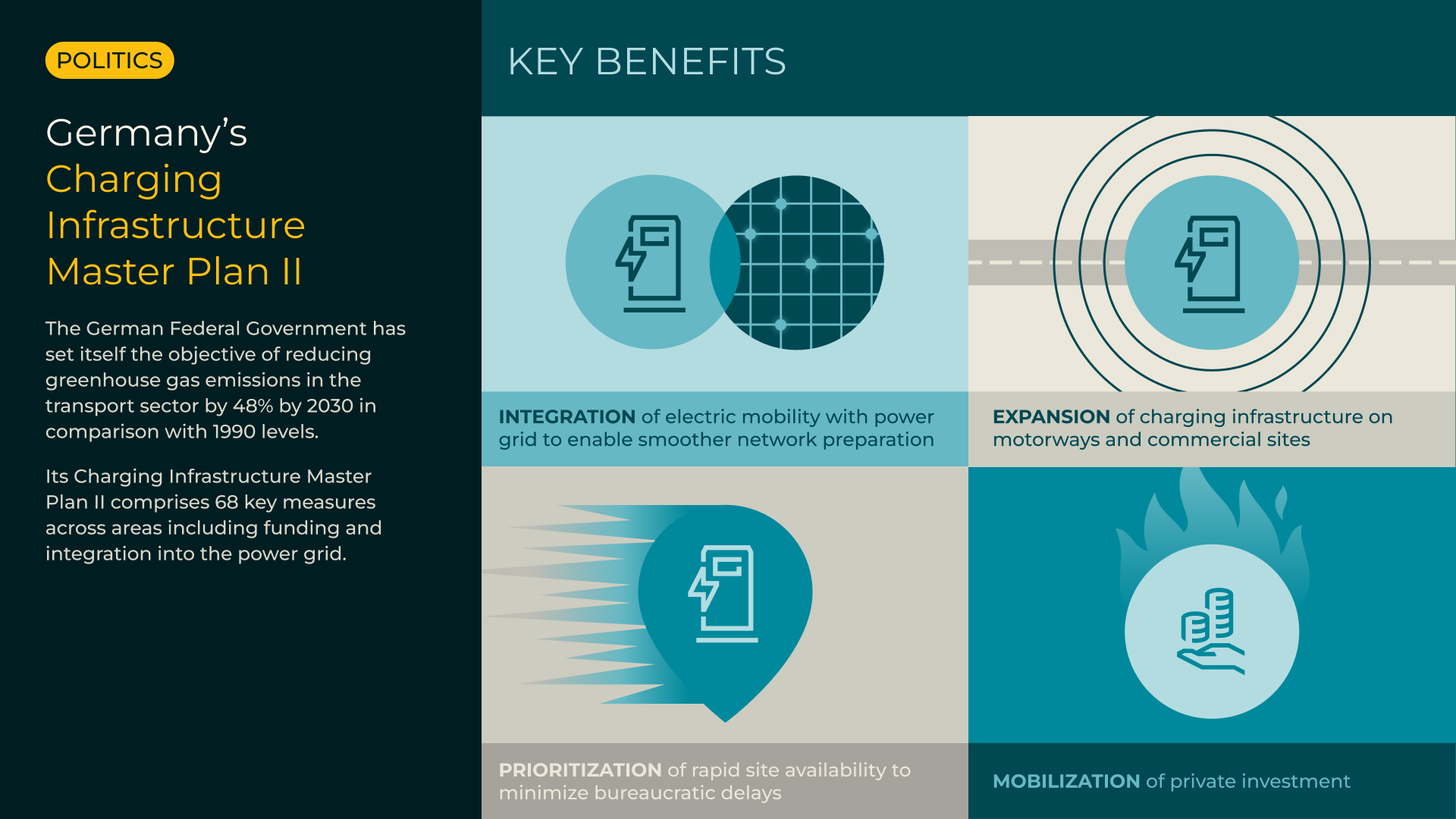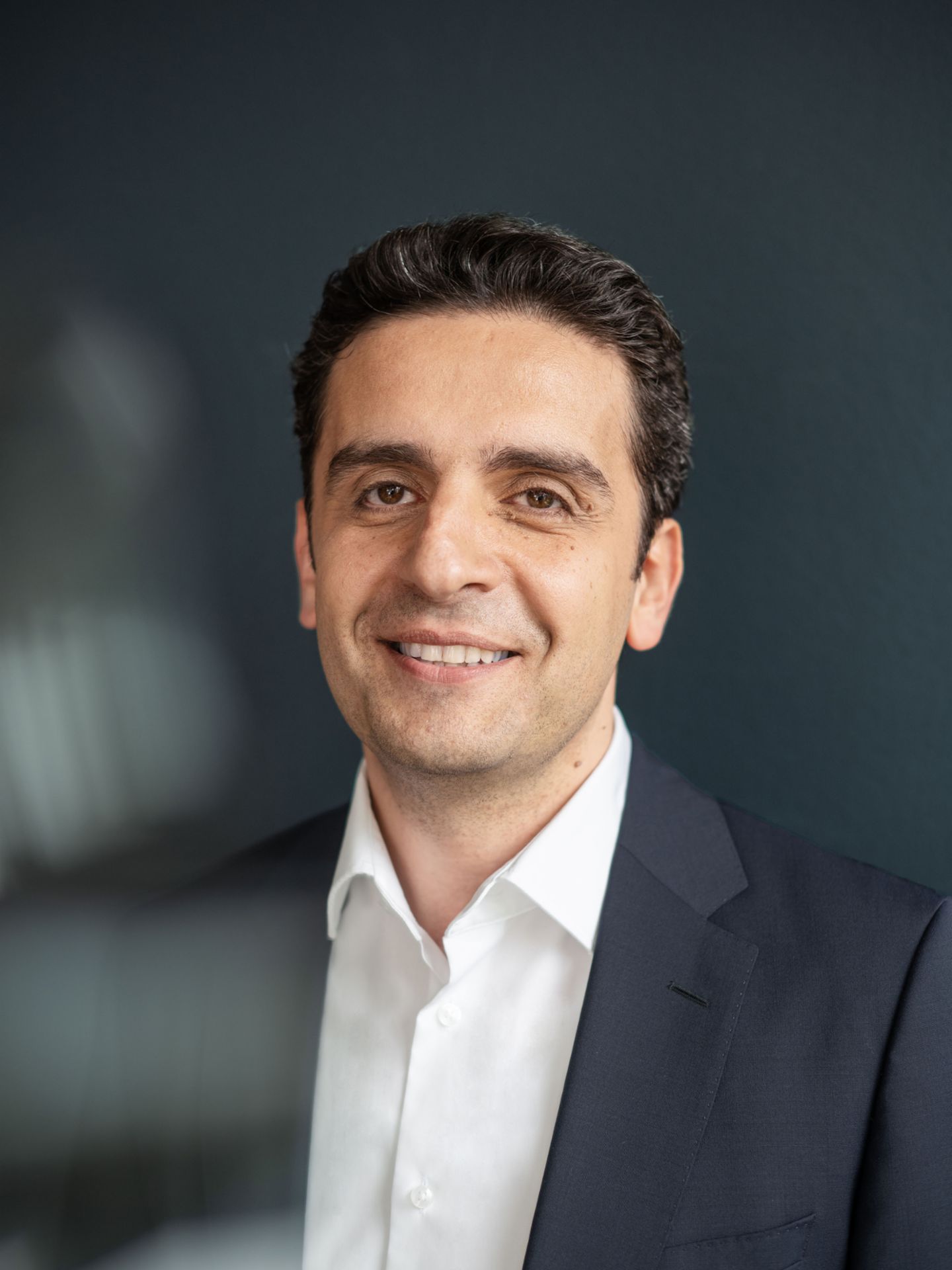The transition to electric transportation is a fundamental measure in the fight against climate change. This is primarily due to the absence of CO2 emissions from battery-powered buses and trucks in contrast to their diesel engine counterparts. Electric vehicles in these categories significantly contribute to curbing greenhouse gas emissions.
“For 10,000 long-haul trucks that we electrify earlier, we can reduce CO2 emissions by up to one million tons of carbon dioxide per year, which is enormous,” says Atif Askar, Head of Business Development, Strategy and M&A in the TRATON GROUP. “The impact of this will not just be substantial, but remarkably feasible compared to alternative measures. We don't require an entirely new technology; batteries and an axle with a wound motor exist today – so on the truck side, we’re ready.”
Nevertheless, electrifying the transportation sector is an intricate endeavor, especially concerning the establishment of a charging infrastructure spanning countries and continents. It necessitates close collaboration between businesses and political entities.
Politics plays a crucial role in safeguarding the climate and influencing corporate planning
The German Environment Agency asserts that the success of climate protection hinges on aligning the efforts of politics, society, and industry. The German Federal Ministry for Economic Affairs and Climate Action, led by Vice Chancellor Robert Habeck, a Green politician, emphasizes the necessity of addressing global challenges like climate change collaboratively with the industry. To ensure the success of this comprehensive social challenge, it is crucial that potential obstacles in implementing climate protection activities are identified proactively.
“To establish suitable framework conditions, the TRATON GROUP and our brands maintain consistent dialogue with political, scientific, media, and business representatives. This engagement includes participation in associations, hosting events, and contributing to discussions in the political sphere.”
Dirk Höke Head of Governmental Relations in the TRATON GROUP
For this reason, the TRATON GROUP, encompassing its Scania, MAN, Navistar and Volkswagen Truck & Bus (VWTB) brands, is committed to advising political decision-makers by leveraging its expertise in commercial vehicles, logistics flows and drive technologies. “We actively and constructively engage in political legislative processes that shape the business models of TRATON GROUP brands and drive the transformation of the commercial vehicle industry,” says Dirk Höke, Head of Governmental Relations in the TRATON GROUP. “To establish suitable framework conditions, the TRATON GROUP and our brands maintain consistent dialogue with political, scientific, media, and business representatives. This engagement includes participation in associations, hosting events, and contributing to discussions in the political sphere.”
TRATON holds the potential to play a significant role in the development of an efficient and rapid charging infrastructure for heavy-duty commercial vehicles across Europe, for example. “Political support is extremely important when it comes to removing regulatory hurdles related to expanding the grid,” says Andreas Kammel, who is overseeing the Group’s strategy for alternative drivetrains. “The successful implementation of the EU´s mandatory CO2 goals for vehicles relies on them being accompanied by suitable and similarly enforced targets for infrastructure development which necessitates the creation of suitable market conditions. This can only be achieved with ample political support.”
.png)
Why expanding charging infrastructure is so important
The EU Commission and the German Federal Government have laid the foundations for the development of battery-electric truck and bus charging infrastructure in Europe through the ‘Alternative Fuels Infrastructure Regulation’ (AFIR) and the ‘Charging Infrastructure Master Plan II’. However, the practical implementation of swiftly establishing a suitable charging network for trucks, in accordance with the ultra-fast MCS (Megawatt Charging System) standard, poses a significant challenge for commercial vehicle manufacturers, logistics companies and infrastructure providers, as well as stakeholders in politics and society.

A recent analysis by Handelsblatt highlights that the lack of charging infrastructure for e-trucks is causing issues for logistics companies in both Germany and Europe. At the TRATON and ABB E-Mobility Parliamentary Evening held in Berlin in May 2023, discussions involving German Transport Minister Dr. Volker Wissing and Christian Levin, CEO of the TRATON GROUP, emphasized the urgency for the German government to solicit bids promptly for the development of an initial network. This initiative aims to secure a minimum of 10,000 public charging points by 2030, with a specific target of at least 4,000 being MCS-compatible.
“The lack of charging infrastructure alone is currently still limiting the ramp-up of electromobility in the commercial vehicle sector. And this problem can only be solved through strong support from European politicians,” said TRATON CEO Christian Levin at the time. The Milence joint venture, established in 2022 by the TRATON GROUP, Daimer Truck and the Volvo Group, stands as a pioneering privately initiated effort to accelerate electromobility for heavy-duty vehicles. The joint venture’s primary objective is to deploy and operate at least 1,700 high-performance green electricity charging points for long-distance trucks and buses, strategically positioned along and near highways and logistics hubs across Europe. The first charging point was officially inaugurated on December 7, 2023.
“The lack of charging infrastructure alone is currently still limiting the ramp-up of electromobility in the commercial vehicle sector. And this problem can only be solved through strong support from European politicians.”
Christian Levin CEO of the TRATON GROUP
Government funding instruments support the introduction of e-mobility in the transportation sector
For the logistics industry’s customers to invest in the new green battery-electric drive technology, appropriate government funding instruments are crucial. Besides developing a charging infrastructure, complementary steps are also necessary. “Additional measures, such as implementing a CO2-based truck toll, raising fossil fuel prices, and instituting support programs for vehicle purchases, are required,” explained Christian Levin.
Initially, battery-electric trucks will remain more expensive to purchase than conventional diesel trucks due to the higher cost of their batteries. Therefore, government subsidy programs for purchasing battery-electric commercial vehicles are essential. These subsidies would offset the higher acquisition costs and hasten the integration of battery-electric vehicles into fleets.
According to Hildegard Müller, President of the German Association of the Automotive Industry (VDA), one thing is clear: “CO2 emission-free trucks and buses will only be added to fleets in large numbers when battery-electric vehicles become more economically viable on the road than those with conventional engines.” Fleet renewal towards emission-free vehicles can only occur comprehensively by providing sufficient incentives for freight forwarders and transport companies. Müller highlights subsidies, toll exemptions, and tax breaks for trucks and buses with reduced carbon dioxide emissions as essential.
“This is the only way to encourage and enable freight forwarders and transport companies to adequately invest in CO2 emission-free vehicles,” emphasizes Müller. Incidentally, the introduction of a CO2-based truck toll from December 2023 aims to encourage Germany’s logistics companies to transition to climate-neutral fleets. Freight forwarders using battery-powered vehicles for transportation will remain exempt from these charges.
Advocating for networked thinking
Energy systems must always be considered within a broader context – a fundamental aspect of TRATON’s political communication. This includes recognizing that “high utilization of commercial vehicle charging infrastructure is key to reduce its effective cost or that trucks can sometimes even reduce strain on the grid by directly utilizing peaks in solar electricity generation during their mid-day top-up”, as Andreas Kammel explains. “TRATON advocates for this interconnected thinking by utilizing available data to inform political decision-makers and the energy industry about how long, and what quantity of energy, our customers will need to charge electric trucks, as well as at which locations this energy must be provided for the transport companies.”
As the electrification strategist overseeing the Group, Kammel provides an example: “Both our Scania and MAN brands, along with our competitors, participated in separate so-called market exploration discussions with the National Charging Infrastructure Control Center (NLL). The NLL is responsible for establishing the charging network in Germany and aims to invite tenders for an initial network for charging heavy-duty commercial vehicles as quickly as possible. These discussions were pivotal for the NLL in terms of location planning, determining the distances between charging points, addressing specific procedures for e-truck charging, distinguishing between publicly accessible MCS intermediate charging points and night charging points for trucks, and allocating charging slots. Additionally, we emphasize the significance of depot charging at our customers’ premises to ensure adequate energy provision for public charging points.”
In these areas, the TRATON GROUP and its brands align with the EU Commission’s mandated objective of achieving carbon neutrality in Europe by 2050. As per the Commission’s proposal, manufacturers of trucks and buses are expected to decrease the carbon dioxide emissions from their newly registered vehicles by 90% by 2040. Furthermore, all new city buses are required be emission-free by 2030. The EU Commission aims to establish a new interim goal for 2030, targeting a 45% reduction in CO2 emissions compared to 2019 (previously 30%), along with a new 65% target for 2035. For this proposal to become law, the EU Parliament and member states need to reach a consensus during upcoming trilogue negotiations with the EU Commission.
Commitment to global standardization of new technical legislation
Decarbonization/electrification, digitalization, automation, and connectivity will each play a key role in optimizing the entire logistics chain. Cooperation among TRATON GROUP brands is poised to yield substantial long-term opportunities, chiefly owing to synergies and additional economies of scale.
“To this end, we’ve expanded our strategy to encompass the development of a modular system and shared foundational technologies, bolstered by a new organizational structure and global solution development.”
Atif Askar Head of Business Development, Strategy and M&A in the TRATON GROUP
The TRATON Modular System empowers our brands to tailor their products – such as the Common Base Engine (CBE), common e-chassis, cabs, batteries, safety functions, autonomous solutions, etc. – in a cost-effective way and deliver customer benefits, while accounting for varying market maturity levels. This approach allows us to optimize our resources, delivering the most efficient technological solutions tailored to our customers’ needs, thereby providing added value and supporting the mobility transition.” Consequently, TRATON advocates for standardized legislation and regulation of new technical standards across all global regions.
The swift progression of urgently required measures to curtail CO2 emissions in transportation hinges upon collaborative efforts among the logistics and technology sectors, vehicle manufacturers, energy companies, and politicians. Therefore, the TRATON GROUP and its brands are committed to sustaining political communication to keep policymakers abreast of the latest advancements in battery technology, critical facets of electromobility, and other technological fields.





